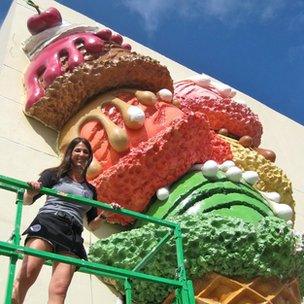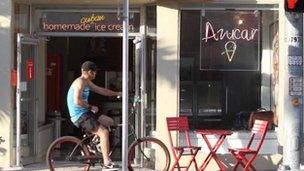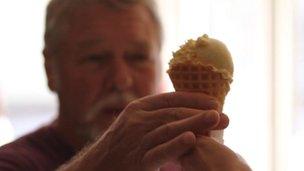My Business: From banking to ice cream making
- Published
my biz updated
What makes an entrepreneur? BBC Mundo's Lorena Arroyo and Heather Sharp hear from Suzanne Batlle, 43, a single-mother who gave up a job in the banking sector to set up an ice cream store bringing the flavours of South America to Miami.
As the huge styrofoam ice-cream cone took shape, day after day, in her Miami backyard, Suzanne Batlle frequently asked herself how she had come to be spending $30,000 (£19,500) on it.
A single-mother supporting two teenage children, she had resigned from a well-paid job in banking and set up an ice-cream shop in the city's Little Havana district.
With bank loans difficult to obtain during the credit crunch, she ploughed $280,000, mainly borrowed from her mother and brother, into the business.
"Actually, it was all my inheritance," she says. "If you jump, you jump."
Azucar, Ms Batlle's shop selling homemade ice-cream in flavours with a Latin American twist, draws its inspiration from her grandmother.
Married to an engineer working for a big Cuban sugar company, her grandmother would collect exotic fruits on her travels around Latin America, and use them to make the frozen dessert.
When the 2008 crisis struck in banking, it ended Ms Batlle's enjoyment of a world in which she'd worked for more than two decades.
"There was no career progression, it became impossible to do business. I hated it."
After a brief stint working as an estate agent, she decided to take the plunge and start her own business.
Ms Batlle spent a couple of months studying "the chemistry and physics" of ice-cream at two specialist institutes, and then enlisted the help of a chef friend and began to concoct her own flavours.
These ranged from the Latin American fruit mamey, to avocado, to rum cake and a blend of guava, cream cheese and crackers, which echoes a popular Cuban habit of eating the three together.
Customers engage in lively debates to help refine the flavours.

Ms Batlle thinks the styrofoam ice cream outside her shop could be the world's biggest
After five months, Ms Batlle is taking $750 a day - enough to cover rent, bills, ingredients, loan repayments and a small wage for herself - although it isn't enough to live on.
At this rate, she says, the business's debts will be paid off within five years.
Family affair
She is not, however, paying staff yet. Family and friends are all pitching in.
"We're family so I have a stronghold on these people," she jokes.
"Of course they get free ice cream, and at night it becomes a bit of a party."
"Suzy" as she's known locally, buzzes with energy as she switches effortlessly between English and Spanish in her sales banter.
But she says the venture has been tougher than she expected.
Costs spiralled from $180,000 to $280,000, as difficulties arose with building renovation and second-hand freezers broke down.
"I didn't realize I'd be there 14 hours a day," she adds, describing a punishing schedule beginning with getting her daughter to school for 6am, and ending after the shop closes at 11pm.

The Azucar Ice Cream Company hopes to emulate Cuba's spirit in Miami's Little Havana
And the scale of the investment weighs heavily.
"I feel anxious every day. You don't sleep at night, you've got a big nut to crack every month - it's brave thing to do. I never realised until I did it," she says.
But although she has been driven to tears at times, Ms Batlle says she has learned to face setbacks.
"When my freezer broke and I had a birthday party coming in and all the ice cream was melted. You think 'oh my god what do I do?' But you start making ice-cream, you serve it soft," she says.
"You just keep going. In banking I never had those problems, but it's funny, you just have to deal with it."
The shop's reputation has grown faster than she had dared to hope, for which she credits its presence on social media networks such as Facebook and Twitter.
Ms Batlle's daughter, Bianca, 14, has taken to appearing around Little Havana in an ice-cream cone suit, in situations ranging from playing dominoes with elderly men, to posing on a fire engine.
"Photos of her exploits have been reposted on the internet and are developing a growing online following," says Ms Batlle.
Ms Batlle hopes to instil in her own children the same work ethic she inherited from her parents, who left behind land and homes in Cuba in 1960 after Fidel Castro established communist rule on the island.
Her mother held down three jobs to help support four children, who in turn were expected to work from their early teens.
'Luxury items'
Even amid the economic downturn, Ms Battle says demand is healthy.
"For $5 you can give yourself a luxury item. They're not buying jewellery, they're not buying art, but they are buying ice cream."

Customers see ice cream as an affordable luxury in a time of economic downturn
Locals, such as her first customer Vidal, initially complained the prices were too high, but Ms Batlle says many have been won over as she has explained the quality of the ingredients she uses.
A local restaurant has recently begun selling her lemon and basil ice-cream, and she hopes eventually to sell wholesale, and also to open other premises.
And now the Styrofoam ice-cream is now proudly displayed on the shop's front she has another goal: to get it certified by the Guinness Book of Records as the world's largest.
- Published21 December 2011
- Published14 December 2011
- Published7 December 2011